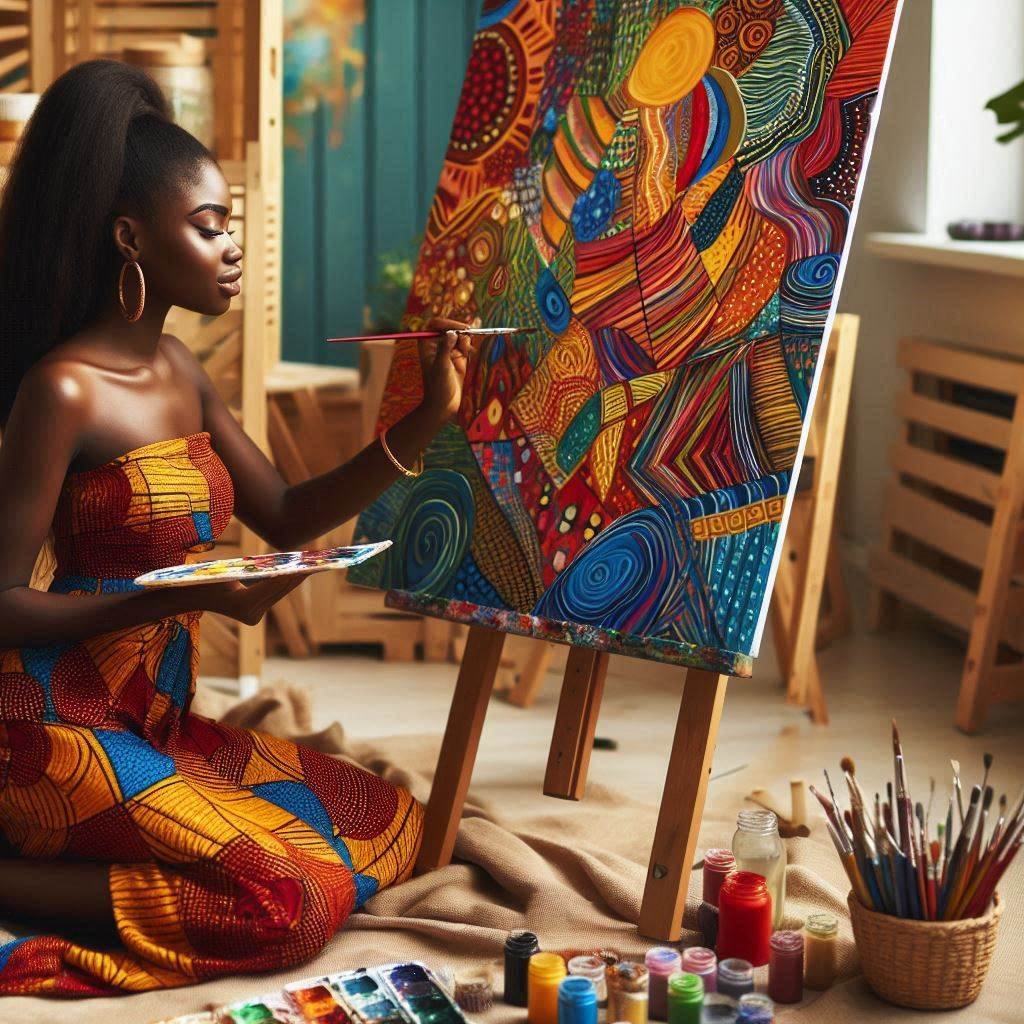Introduction
Nigerian women have significantly contributed to the arts, enriching the nation’s cultural landscape.
Their artistic expressions span various forms, including literature, music, visual arts, and dance.
Highlighting these contributions is crucial for recognizing their impact and inspiring future generations.
Nigerian women artists often address social issues, offering unique perspectives and challenging societal norms.
Their work fosters cultural pride and promotes social change.
Celebrating these artists ensures their contributions are acknowledged and valued.
It also encourages more women to pursue artistic careers.
Recognizing Nigerian women’s achievements in the arts strengthens the cultural heritage and inspires creativity.
This section will explore the vital roles Nigerian women have played in shaping the arts.
By examining their contributions, we gain a deeper understanding of their influence on society.
Nigerian women continue to break barriers and redefine artistic expression.
Their stories deserve to be celebrated and remembered for generations to come.
History of Nigerian Women in the Arts
Historical Background
Nigerian women have played a significant role in the arts for centuries.
They have been involved in various artistic disciplines such as music, dance, visual arts, literature, and theater.
Despite facing challenges such as gender discrimination and limited opportunities, Nigerian women have continued to make their mark in the arts.
Key Figures in the Nigerian Arts Scene
- Nike Davies-Okundaye: A renowned textile artist known for her Adire (traditional Yoruba indigo-dyed cloth) designs.
- Chinwe Chukwuogo-Roy: A prolific painter and sculptor who has gained international recognition for her works.
- Tara Fela-Durotoye: A makeup artist and beauty entrepreneur who has revolutionized the beauty industry in Nigeria.
- Zina Saro-Wiwa: A filmmaker and photographer whose work focuses on the intersection of culture, environment, and identity.
Milestones in Nigerian Art History
- 1950s-1960s: The emergence of the Zaria Art Society, which laid the foundation for contemporary Nigerian art.
- 1970s: The establishment of art institutions such as the Nsukka School and the Mbari Club, fostering creativity and talent.
- 1980s: The rise of female artists like Peju Alatise and Ndidi Dike, who challenged societal norms through their work.
- 1990s-2000s: The recognition of Nigerian women artists on the global stage, with exhibitions and awards showcasing their talent.
- Present Day: Nigerian women continue to excel in the arts, breaking boundaries and pushing the limits of creativity.
Generally, Nigerian women have made invaluable contributions to the arts, shaping the cultural landscape of the country and beyond.
Their resilience, creativity, and passion have paved the way for future generations of female artists to thrive and succeed.
Read: Psychological Impact of COVID-19 on Nigerians
Women in Traditional Nigerian Arts
Throughout history, Nigerian women have played a significant role in various traditional art forms, including pottery, weaving, and beadwork.
These art forms are not only a means of creative expression but also hold deep cultural significance in Nigerian society.
Pottery
- Women in Nigeria have been actively involved in pottery making for centuries, passing down techniques and traditions from generation to generation.
- Pottery plays a crucial role in Nigerian culture, as it is used for both functional and decorative purposes. Women artisans create intricate designs that reflect their cultural heritage.
- From pots to jars to plates, Nigerian women showcase their craftsmanship and artistry through pottery, preserving their cultural identity and traditions.
Weaving
- Weaving is another traditional art form where Nigerian women have excelled, using local materials such as raffia and cotton to create beautiful textiles.
- These woven fabrics are often used for clothing, accessories, and household items, showcasing the skill and creativity of Nigerian women in the art of weaving.
- Women weavers incorporate intricate patterns and vibrant colors into their designs, adding a unique flair to Nigerian traditional attire and cultural artifacts.
Beadwork
- Beadwork is a popular art form among Nigerian women, who use colorful beads made from glass, coral, and other materials to create stunning jewelry and accessories.
- These intricate beadwork designs are not only aesthetically pleasing but also hold symbolic meanings, representing aspects of Nigerian culture, beliefs, and traditions.
- Nigerian women artisans are known for their skilled beadwork, which is often passed down through families and communities, preserving cultural heritage and craftsmanship.
In essence, Nigerian women’s contributions to traditional arts, such as pottery, weaving, and beadwork, are invaluable in preserving the cultural heritage and identity of Nigeria.
Through their creative talents and mastery of these art forms, women artisans continue to play a vital role in shaping Nigerian culture and showcasing its richness and diversity to the world.
Read: How Nigerian Schools Address Student Psychology
Women in Contemporary Nigerian Arts
When it comes to the arts in Nigeria, women have made significant contributions that cannot be overlooked. In modern art movements like Nollywood, literature, and music, Nigerian women have continued to thrive and excel.
Analysis of the presence of Nigerian women in modern art movements
- Nollywood: Nigerian women have played vital roles in the growth and development of Nollywood, Africa’s largest film industry. From acting to producing, directing, and scriptwriting, women have been at the forefront of this booming industry.
- Literature: Nigerian female writers have made a mark on the global literary scene. Renowned authors like Chimamanda Ngozi Adichie, Buchi Emecheta, and Flora Nwapa have captivated audiences with their powerful storytelling and unique perspectives.
- Music: In the Nigerian music industry, female artists have carved out a niche for themselves and are making waves both locally and internationally. Artists like Tiwa Savage, Yemi Alade, and Niniola are breaking boundaries and shattering stereotypes.
Recognizing the achievements of female artists, writers, and performers
- Female Artists: Nigerian female visual artists have gained recognition for their creativity and innovation. Artists like Nike Davies-Okundaye, Njideka Akunyili Crosby, and Peju Alatise have showcased their works on the global stage and have received critical acclaim.
- Writers: Nigerian female writers have won prestigious literary awards and accolades for their works. Their storytelling has shed light on diverse themes and issues, resonating with readers worldwide.
- Performers: Female performers in Nigeria have entertained audiences with their exceptional talents and skills. From stage performances to music concerts, Nigerian women have proven their prowess in the performing arts.
Overall, Nigerian women continue to make remarkable contributions to the arts, pushing boundaries and making a lasting impact on the cultural landscape of Nigeria and beyond.
Read: Renowned Nigerian Psychologists to Follow

Challenges Faced by Nigerian Women in the Arts
Nigerian women artists face various challenges that hinder their growth and recognition in the art industry.
These obstacles are primarily rooted in societal norms, gender bias, and lack of opportunities.
It is crucial to address these issues to create a more inclusive and supportive environment for female artists.
Gender Bias
- Gender bias is a significant challenge that Nigerian women artists face in the arts sector.
- Women are often overlooked or undervalued compared to their male counterparts.
- There is a perception that art is a male-dominated field, which marginalizes female artists.
- Some art institutions and galleries prioritize male artists, leaving women with fewer opportunities.
Lack of Opportunities
- Nigerian women artists struggle to access the same opportunities as men in terms of exhibitions, grants, and residencies.
- Many art institutions and organizations are biased towards male artists, limiting the chances for women to showcase their work.
- Female artists often face challenges in networking and establishing connections within the art community.
- The lack of mentorship and support systems for women artists hinders their professional growth and development.
Addressing the need for greater support and recognition for female artists is essential to promote gender equality and diversity in the arts.
By raising awareness about the challenges faced by Nigerian women artists, we can work towards creating a more inclusive and equitable art sector that empowers all artists, regardless of gender.
Read: Challenges in Teaching Christian Religious Studies
Gain More Insights: Scholarships for Mass Communication Students Nigeria
Learn More: The Art of Fashion Illustration: A Nigerian Perspective
Discover More: Top Nigerian Art Schools and Design Institutions
Delve into the Subject: Arabic Language Proficiency Exams in Nigeria
Impact of Nigerian Women in the Arts
Examining the Influence of Nigerian Women Artists on the Global Arts Landscape
Nigerian women have profoundly impacted the global arts landscape, influencing and inspiring audiences worldwide.
Their unique artistic voices resonate across borders, breaking cultural barriers and enriching the global arts scene.
These women use their creativity to tell compelling stories, often rooted in their personal and cultural experiences.
Through various mediums, including literature, music, visual arts, and film, Nigerian women artists address universal themes with a distinct perspective.
One significant aspect of their influence is the way they shape cultural narratives.
Nigerian women artists often draw from their rich heritage, blending traditional elements with contemporary themes.
This fusion creates powerful works that speak to both local and international audiences.
By doing so, they preserve and promote Nigerian culture while also making it accessible and relatable to a broader audience.
This cultural exchange fosters greater understanding and appreciation of Nigerian traditions and values.
How Their Work Contributes to Shaping Cultural Narratives and Challenging Stereotypes
These artists also play a crucial role in challenging stereotypes.
Through their work, they confront and dismantle misconceptions about Nigerian and African women.
They portray diverse and multifaceted characters, showcasing their strength, resilience, and complexity.
This portrayal counters the often one-dimensional and negative stereotypes that dominate mainstream media.
By presenting authentic and nuanced depictions, Nigerian women artists contribute to a more accurate and positive representation of African women globally.
For instance, writers like Chimamanda Ngozi Adichie have gained international acclaim for their insightful and thought-provoking works.
Adichie’s novels and essays highlight the complexities of Nigerian society and the experiences of Nigerian women.
Her work challenges readers to rethink their assumptions and broaden their perspectives.
Similarly, visual artists like Njideka Akunyili Crosby create striking artworks that blend Nigerian and American influences, exploring themes of identity, migration, and cultural hybridity.
Crosby’s work has been exhibited in prestigious galleries worldwide, earning her recognition and accolades.
In the music industry, artists like Tiwa Savage and Yemi Alade have achieved global success, bringing Nigerian music to international audiences.
Their songs often celebrate African culture and address social issues, from empowerment to inequality.
By doing so, they not only entertain but also educate and inspire their listeners.
The impact of Nigerian women in the arts extends beyond their individual achievements.
They serve as role models and trailblazers, paving the way for future generations of female artists.
Their success demonstrates that Nigerian women can excel in the arts, despite the challenges they may face.
This representation is crucial for young women who aspire to pursue careers in the arts, providing them with the confidence and motivation to follow their passions.
Conclusion
In closing , Nigerian women have made significant contributions to the arts scene in Nigeria.
They have excelled in various fields such as music, literature, visual arts, and performing arts.
It is important to recognize and celebrate the achievements of these female artists, as they have brought unique perspectives and stories to the forefront of Nigerian culture.
By supporting and uplifting Nigerian women in the arts, we are not only promoting gender equality but also nurturing creativity and talent within the country.
The work of Nigerian women in the arts serves as inspiration for future generations, showing that talent knows no gender boundaries and that women can thrive in any artistic endeavor they choose to pursue.
As we continue to showcase and honor the contributions of Nigerian women in the arts, we are not only enriching the cultural landscape of Nigeria but also empowering women to express themselves freely and creatively.




